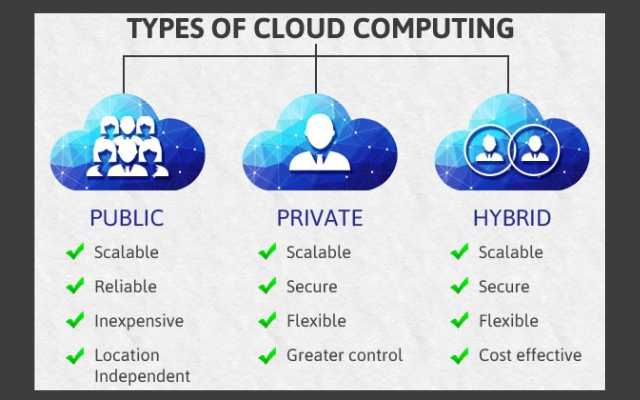Choosing the Right Cloud Storage: Private, Hybrid, or Public?

Choosing the Right Cloud Storage: Private, Hybrid, or Public? Cloud storage has become a ubiquitous part of modern computing, allowing individuals and organizations to store and access their data from anywhere in the world. However, choosing the right type of cloud storage can be a daunting task, as there are several different options available, each with its own advantages and disadvantages. In this article, we will explore the three main types of cloud storage: private, hybrid, and public, and discuss the benefits and drawbacks of each.
Private Cloud Storage
Private cloud storage refers to cloud storage that is managed by a single organization and is not shared with other entities. This type of cloud storage is typically used by larger organizations with sensitive data that requires a high level of security and control. Private cloud storage can be deployed on-premises, within an organization’s own data center, or in a third-party data center.
The benefits of private cloud storage include enhanced security, greater control, and better performance. Because the cloud is not shared with other entities, there is a reduced risk of data breaches or other security issues. Additionally, organizations have complete control over their data and can customize the cloud storage environment to meet their specific needs. Finally, private cloud storage can offer better performance than public cloud storage because the resources are dedicated solely to the organization that owns them.
However, there are also some drawbacks to private cloud storage. The cost of setting up and maintaining a private cloud can be significant, as it requires specialized IT expertise and hardware infrastructure. Additionally, because the resources are dedicated solely to one organization, there is a risk of underutilization, which can lead to wasted resources and increased costs.
Hybrid Cloud Storage
Hybrid cloud storage is a combination of private and public cloud storage. This type of cloud storage is used by organizations that want the security and control of private cloud storage for sensitive data, but also want the scalability and cost-effectiveness of public cloud storage for non-sensitive data.
The benefits of hybrid cloud storage include flexibility, scalability, and cost-effectiveness. Organizations can use private cloud storage for sensitive data and public cloud storage for non-sensitive data, allowing them to scale their storage needs as their business grows. Additionally, because public cloud storage is typically less expensive than private cloud storage, organizations can save money by using public cloud storage for non-sensitive data.
However, there are also some drawbacks to hybrid cloud storage. The complexity of managing two different cloud storage environments can be challenging, requiring specialized IT expertise. Additionally, there is a risk of data breaches or other security issues when sensitive data is transferred between the private and public clouds.
Public Cloud Storage
Public cloud storage refers to cloud storage that is provided by third-party vendors, such as Amazon Web Services (AWS), Microsoft Azure, or Google Cloud Platform. Public cloud storage is typically used by individuals and small to medium-sized businesses that do not have the resources or expertise to manage their own private cloud storage.
The benefits of public cloud storage include ease of use, scalability, and cost-effectiveness. Public cloud storage is easy to set up and use, with no specialized IT expertise required. Additionally, public cloud storage is highly scalable, allowing organizations to quickly and easily add or remove storage as their needs change. Finally, public cloud storage is typically less expensive than private cloud storage, as the resources are shared among many different organizations.
However, there are also some drawbacks to public cloud storage. Security and privacy concerns are the main issues, as organizations have less control over their data and must rely on the third-party vendor to keep their data secure. Additionally, public cloud storage can be slower than private cloud storage, as the resources are shared among many different organizations.
Which Cloud Storage Solution is Right for Your Business?
Choosing the right cloud storage solution for your business will depend on several factors, including your budget, data security needs, and scalability requirements. Some businesses may benefit from the increased control and security offered by private cloud storage, while others may prefer the increased flexibility and scalability offered by public cloud storage.
Ultimately, the best solution for your business will depend on your specific needs and requirements. By understanding the differences between private, hybrid, and public cloud storage, you can make an informed decision that meets your business goals. Here are some factors to consider when choosing a cloud storage solution for your business:
- Security Needs: If your business deals with sensitive data or is subject to regulatory compliance, a private or hybrid cloud storage solution may be the best option. These solutions offer greater control over security and privacy, making it easier to meet regulatory requirements and maintain data confidentiality.
- Scalability: Public cloud storage solutions are highly scalable and can handle large amounts of data with ease. If your business requires flexibility and scalability, a public cloud storage solution may be the best option. Hybrid cloud storage can also provide scalability while still allowing for greater control and security.
- Cost: Private cloud storage solutions can be more expensive to set up and maintain, but can offer greater control and security for sensitive data. Public cloud storage solutions are typically more cost-effective but may not provide the same level of control or security.
- Expertise: Depending on the cloud storage solution you choose, you may need to have specific expertise in-house to set up and maintain the system. Private cloud storage solutions typically require more technical expertise, while public cloud storage solutions are more user-friendly.
- Compliance: If your business needs to comply with certain regulations, such as HIPAA or GDPR, you will need to choose a cloud storage solution that meets these requirements. Private cloud storage solutions may be better suited for meeting compliance requirements due to their greater control over data security.
In short, choosing the right cloud storage solution for your business requires careful consideration of your specific needs and requirements. By weighing the pros and cons of private, hybrid, and public cloud storage, and taking into account factors such as security, scalability, cost, expertise, and compliance, you can make an informed decision that meets your business goals.
Differences between private, hybrid, and public cloud storage:
Here is a table that summarizes the key differences between private, hybrid, and public cloud storage:
| Feature | Private Cloud Storage | Hybrid Cloud Storage | Public Cloud Storage |
|---|---|---|---|
| Ownership | Single organization | Single organization | Third-party vendor |
| Security | High | High | Lower |
| Control | Full | Full for private, limited for public | Limited |
| Performance | High | High for private, lower for public | Lower |
| Scalability | Limited | High | High |
| Cost-effectiveness | Limited | High for public, lower for private | High |
| Complexity | High | High | Low |
| Resource Utilization | High | Optimal | Shared |
It is important to note that these are generalizations and that the actual differences can vary depending on the specific vendor and implementation.
Read Also: Cloud Kitchen: Technology changed Traditional Kitchen
Conclusion
In conclusion, choosing the right type of cloud storage is an important decision for any organization or individual. Private cloud storage offers enhanced security, greater control, and better performance, but can be expensive to set up and maintain. Hybrid cloud storage provides a balance between security, control, scalability, and cost-effectiveness, but can be complex to manage. Public cloud storage offers ease of use, scalability, and cost-effectiveness, but can raise concerns about security and privacy.
Ultimately, the right type of cloud storage depends on the specific needs and priorities of each organization or individual. Factors to consider include the sensitivity of the data, the level of control required, the need for scalability, and the available resources and expertise. It is also important to carefully evaluate and compare different vendors and their offerings before making a decision.
In summary, private, hybrid, and public cloud storage each have their own benefits and drawbacks, and organizations and individuals should carefully consider their options before choosing the type of cloud storage that is right for them.
- Private Cloud Data Storage: Is It the Right Choice for Your Business?
- Exploring the Advantages of Hybrid Cloud Storage for Data Security and Flexibility
- Exploring Cloud Storage: How Companies are Approaching Cloud Storage and Managing Their Data
FAQs:
Q: What is private cloud storage?
A: Private cloud storage is a cloud computing model where data is stored and managed on a private network, usually within a company’s own data center. This type of storage is often preferred by businesses with sensitive data, who require greater control over their data security.
Q: What is hybrid cloud storage?
A: Hybrid cloud storage is a combination of public and private cloud storage. This approach allows businesses to store some of their data on public cloud servers while keeping other data in a private cloud. This provides a more flexible and cost-effective solution than relying solely on private cloud storage.
Q: What is public cloud storage?
A: Public cloud storage is a cloud computing model where data is stored and managed on a third-party server, accessible over the internet. This type of storage is often more cost-effective and scalable than private cloud storage, but may not be suitable for sensitive data due to security concerns.
Q: What are the benefits of private cloud storage?
A: Private cloud storage offers greater control and security over sensitive data. Businesses have the ability to customize their storage and network infrastructure, ensuring that data is stored in compliance with industry regulations. Private cloud storage also offers higher levels of performance and reliability compared to public cloud storage.
Q: What are the benefits of hybrid cloud storage?
A: Hybrid cloud storage offers businesses the flexibility to store data on both public and private cloud servers. This allows businesses to take advantage of the scalability and cost-effectiveness of public cloud storage while also ensuring the security and control of private cloud storage.
Q: What are the benefits of public cloud storage?
A: Public cloud storage is often more cost-effective and scalable than private cloud storage. It requires minimal maintenance and infrastructure, making it an ideal solution for businesses with limited resources. Public cloud storage also allows for easy collaboration and access to data from anywhere with an internet connection.
Q: How do I choose the right cloud storage for my business?
A: The choice between private, hybrid, or public cloud storage depends on your business’s specific needs and requirements. Consider factors such as the sensitivity of your data, your budget, and your required level of control and customization. It may be helpful to consult with a cloud storage provider or IT expert to determine the best solution for your business.
Specification Table:
| Specification | Private Cloud Storage | Hybrid Cloud Storage | Public Cloud Storage |
|---|---|---|---|
| Data Security | High | High | Low |
| Customization | High | High | Low |
| Scalability | Low | High | High |
| Cost | High | Medium | Low |
| Accessibility | Limited | High | High |
Pros and Cons Table:
| Pros and cons | Private Cloud Storage | Hybrid Cloud Storage | Public Cloud Storage |
|---|---|---|---|
| Pros | Greater control and security over sensitive data | Flexible and cost-effective solution | More cost-effective and scalable solution |
| Higher levels of performance and reliability compared to public cloud storage | Ability to take advantage of scalability and cost-effectiveness of public cloud storage | Minimal maintenance and infrastructure requirements | |
| Customizable storage and network infrastructure | Offers security and control of private cloud storage | Easy collaboration and access to data from anywhere with an internet connection | |
| Cons | Higher cost and limited scalability | Requires careful management and integration with private cloud storage | Limited control and customization |
| Limited accessibility outside of the private network | May require additional security measures to ensure the security of data stored on public cloud | Data may be subject to security breaches due to the shared nature of public cloud |






